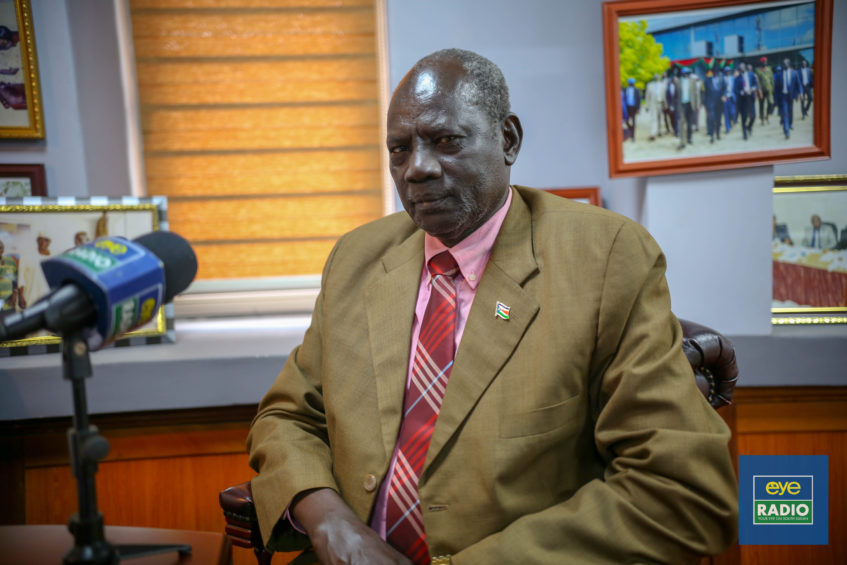
South Sudan Info.Min. and RTGoNU spokesperson, Michael Makuei talks to Eye Radio in Juba -October 23, 2020 | Credit| Lou Nelson/Eye Radio
The government’s spokesperson has described as “baseless and unfounded” a report which suggests that rampant abusive surveillance by National Security Service has instilled climate of fear on its citizens.
In the report released on Tuesday, Amnesty International says NSS is using abusive surveillance to terrorize journalists, activists and critics, leading to a climate of intense fear and self-censorship.
The report, titled: “These Walls Have Ears” – The Chilling Effect of Surveillance in South Sudan,” presents new evidence of the South Sudanese authorities’ surveillance capabilities, and also highlights the role played by telecommunication and surveillance companies who enable the interception of phone calls without adequate legal safeguards.
The human rights watchdog notes it discovered documents that show an Israeli company, Verint Systems Ltd, supplied communications interception technology to the South Sudanese government at least between 2015 and 2017, despite the high risk that the equipment could contribute to human rights violations.
“Unchecked and unlawful surveillance by the NSS is having a chilling effect on civil society and peaceful activism. The threat of surveillance is a weapon in itself – government critics and human rights activists told us they live in constant fear of being spied on,” says Deprose Muchena, Amnesty International’s director for East and Southern Africa.
Fictitious reports
Michael Makuei claims that these are reports concocted by people to earn a living.
“These are baseless and unfounded reports written against the government of South Sudan so that people earn a living,” he asserted.
“Let them earn their living in other ways other than writing fictitious reports in order to tarnish the image of the government of South Sudan. I think this person must be writing inside his room in a hotel in South Sudan.”
However, Amnesty reiterated that credible and consistent accounts from multiple sources demonstrate that intelligence agents have infiltrated NGOs, the media, private sector security companies and hotels.
The depth and breadth of the NSS’s spy network creates an environment that infringes on freedom of opinion, expression and privacy Amnesty claims.
It says tapped telephone conversations have been presented as evidence in court, and at least one high profile case was thrown out by the judges on grounds that the recordings were illegally obtained and violated the right to privacy.
Amnesty says telecoms company MTN South Sudan, through an Israeli company has installed a ‘box’ for the security agents to gain direct access to data from service providers.
Amnesty states that it wrote to all the companies regarding the findings and only received a response from MTN Group, which said that South Sudanese authorities and laws require telecommunications companies “to cater for legal interception” and explaining that MTN does not operate the system.
It, however, calls on the South Sudanese government to stop the use of surveillance until a proper human rights regulatory framework is in place and to urgently conduct independent investigations into cases of unlawful surveillance and other human rights violations to hold those responsible to account.
Makuei admits that the government purchased a surveillance machines for intercepting information but claims the gadget is for surveilling criminals and not the people of South Sudan.
“Those are people who are against the law or those who are in conflict with the law. They are the ones that must be tracked down, not any individual who is using his telephone,” he added.
Muchena calls on the South Sudanese authorities to halt the unlawful practices of the NSS and enable people to exercise their freedom of expression without fear of reprisals.
Since South Sudan’s independence in July 2011, freedom of expression has been severely restricted, and the country is considered by the United Nations Commission on Human Rights in South Sudan as one of the most dangerous places in the world to be a journalist.
The government, primarily through the NSS, uses intimidation, harassment, arbitrary arrests, prolonged detention, torture, and other ill-treatment, enforced disappearances and extra-judicial killings to silence government critics, human rights activists and journalists, according to several reports issued by the watchdog.
It says in its two-year investigation, 63 people, including South Sudanese activists, journalists and lawyers, shared their experiences and knowledge of physical and communications surveillance in South Sudan.
Amnesty International also says it has reviewed over 57 reports and studies by UN bodies, intergovernmental, non-governmental organizations, as well as resolutions, laws and conventions.
It says South Sudan’s legal framework gives the NSS sweeping, yet unchecked, powers to conduct surveillance without sufficiently protecting the right to privacy.
It cites that the NSS deploys agents throughout South Sudan and neighboring countries, penetrating all levels of society and daily life.
Support Eye Radio, the first independent radio broadcaster of news, information & entertainment in South Sudan.
Make a monthly or a one off contribution.
Copyright 2024. All rights reserved. Eye Radio is a product of Eye Media Limited.